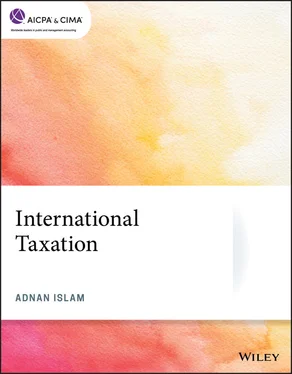U.S. businesses are on the cash method of accounting with respect to amounts owed to a related foreign person except where the related foreign person is a CFC, a passive foreign investment company or a foreign personal holding company, in which case the U.S. business can deduct accrued amounts as of the day on which a corresponding amount of income is recognized by the CFC, the passive foreign investment company or the foreign personal holding company.
Effective October 22, 2004, accrued but unpaid amounts due from a U.S. business to a related CFC or passive foreign investment company cannot be deducted by the U.S. business until a corresponding amount is included in the gross income of a U.S. person(s) who owns stock, directly or through a foreign entity, in the CFC or the passive foreign investment company.
 Example 1-3
Example 1-3
Assume in example 1-1, that Sessions Corporation takes a working capital advance from its Sao Paulo office. The working capital advance to the U.S. office is documented in a promissory note and bears interest at a market rate. Sessions U.S. accrues a quarterly interest payment to its Sao Paulo office on December 31, the end of Sessions U.S. tax year and pays the amount accrued January 10 of the following tax year. Sessions U.S. cannot deduct the interest payment accrued but not paid December 31 until actually paid in the subsequent tax year.
In some situations, a U.S. business will recognize income when goods are delivered to a foreign person. If the purchaser makes advance deposits with the seller or the purchaser pays with an irrevocable letter of credit, delivery of the goods may trigger recognition of income to the U.S. business. However, if the U.S. business ships goods on consignment to a foreign dealer, the U.S. business will recognize income after the goods are sold by the dealer.
Introduction of International Tax Provisions enacted by the TCJA
Select general tax provisions of the TCJA
The TCJA provisions affect tax years beginning in 2018, with some exceptions.
A permanent 21% corporate income tax rate effective in 2018, representing a 40% decrease over the prior corporate income tax rate of 35%
Limitations on business and personal net operating losses and business interest deductions
Repeal of the corporate alternative minimum tax (AMT)
Repeal of the domestic production activities deduction (DPAD)
New broader interest expense limitation regulations under Section 163(j) that limit interest expense to 30% of Adjusted Taxable Income (ATI)
A 20% deduction for qualifying pass-through income from partnerships, LLCs, and S corporations; notable exceptions (SSTBs) that do not qualify are in consulting, accounting, law, healthcare and medicine, and related fields — The “pass-through deduction” for up to 20% of Qualified Business Income of U.S. pass-through business entities under Section 199A (generally requires W-2 employee expense) that require modeling between the effective tax rate of a pass-through entity versus a C corp entity.
Revisiting the technical rules surrounding the Accumulated Earnings Tax (Sections 531, 532) and Personal Holding Company Tax (Sections 541-543) for C corporations
Introduction and listing of U.S. international tax provisions
One-time repatriation tax on accumulated foreign subsidiary’s earnings, Section 965 “transition tax”
The TCJA imposes a one-time tax on a 10% or greater U.S. shareholder’s share of the accumulated and previously untaxed foreign earnings and profits of specified foreign corporations (SFCs). SFCs are defined as CFCs and other foreign corporations having a domestic corporate shareholder with at least 10% ownership. The post-1986 accumulated earnings of all SFCs will be treated as an increase to current-year Subpart F income and mandatorily deemed repatriated to their “U.S. shareholders.”
Repatriated earnings held in cash and cash equivalents will be taxed at a 15.5% rate, and the remaining amount of earnings held in illiquid assets will be taxed at an 8% rate. For 10% U.S. C corporation shareholders, a proportional, partial foreign tax credit is allowed.
The amount of accumulated foreign earnings and profits subject to mandatory repatriation will be determined as of November 2, 2017, or December 31, 2017, whichever is greater. The first installment (or the entire amount) is due by the original due date of the tax return filed for the last tax year beginning before January 1, 2018, without regard to extensions. For calendar-year filers, this would be the tax year beginning January 1, 2017, and ending December 31, 2017, which means that the first installment (or the entire amount) was due April 17, 2018.
For S corporations subject to the deemed repatriation tax, there is a special provision that defers the tax until the S corporation sells substantially all of its assets, ceases to conduct business, changes its tax status, or the electing shareholder transfers its stock.
U.S. base erosion provisions — “BEAT,” Section 59A (inbound tax provision)
The BEAT is an alternative minimum tax on corporations that have annual gross receipts for the three prior years of at least $500m and that make certain “base erosion” payments to foreign related parties in excess of a threshold amount.
Base erosion payments include amounts paid or accrued to a foreign related party that are deductible against U.S. taxes, such as interest, royalties, and service fees (but do not include costs of goods sold).
The BEAT tax rate is 5% for tax years beginning in 2018, 10% for tax years 2019 through 2025, and 12.5% for tax years beginning after 2025.
A further base erosion provision also applies to deny a deduction for certain payments of interest and royalties to related parties either pursuant to a hybrid transaction, whereby the characterization of the payment differs between U.S. and foreign tax law, or by or to a hybrid entity (a foreign disregarded entity) where the payment is not included in income by the related party.
Base erosion provisions are modified to clarify that dividends received by an individual from a surrogate foreign corporation as a result of an inversion transaction are not qualified dividends and, therefore, are not eligible for the lower qualified dividend rates.
Global intangible low-taxed income, Sections 951A and 250
Summary: minimum (that is, generally 10.5% to 13.125%) U.S. income tax on CFC’s annual, computed income, determined after Subpart F income
The effect of the GILTI provision is to subject U.S. shareholders of CFCs to current taxation on the aggregate net income of the CFCs over a routine return.
The GILTI provision applies to the tax years of a CFC that begin after December 31, 2017, and to U.S. shareholders of such CFC in which or with which such tax years of the CFC end.
U.S. corporate shareholders of CFCs (but not individuals, partnerships, or S corporations) are allowed to deduct 50% of GILTI for tax years beginning after December 31, 2017, and before January 1, 2026, and 37.5% of GILTI after 2026.
U.S. corporate shareholders of CFCs can also claim a foreign tax credit with respect to included GILTI amounts, but such foreign tax credit is limited to 80% of the foreign tax paid, and any unused FTCs cannot be carried forward or carried back to other tax years.
U.S. individual shareholders of CFCs that implemented the Section 962 election pursuant to the Regulations released in 2019, (a) will also be allowed to deduct 50% of GILTI for tax years beginning after December 31, 2017, and before January 1, 2026, and (b) may claim a foreign tax credit with respect to included GILTI amounts, but such foreign tax credit is limited to 80% of the foreign tax paid, and any unused FTCs cannot be carried forward or carried back to other tax years.
Читать дальше

 Example 1-3
Example 1-3










